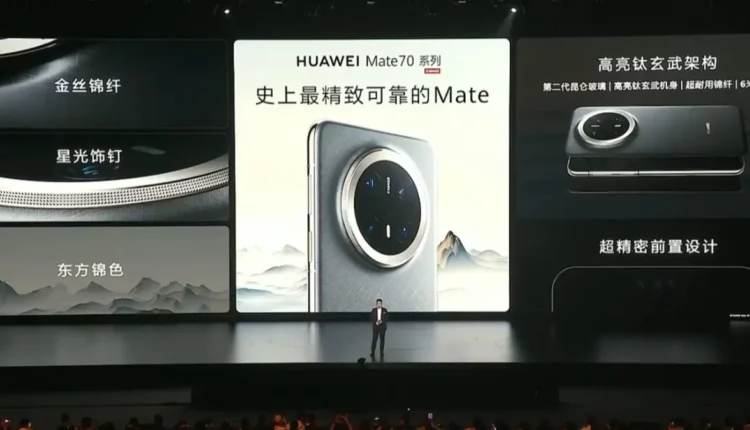©2021 Reporters Post24. All Rights Reserved.
Huawei on Tuesday launched the Mate 70 series of smartphones that can run on the company’s latest self-developed operating system, as the Chinese giant continues its push toward technological independence in the wake of U.S. sanctions.
The Mate 70 is the successor of the Mate 60, which was released last year and sent shockwaves through the tech and political worlds. It contained a semiconductor that many had thought Huawei and China would find difficult to produce, given the widespread the U.S. restrictions that have looked to cut off the world’s second-largest economy from leading-edge chips. Huawei was separated from Google’s Android operating system in 2019, forcing the Chinese tech giant to develop its own software.
- Huawei launched the Mate 70, Mate 70 Pro and Mate 70 Pro+ and foldable Mate X6 on Tuesday.
- The devices can run onHarmonyOS NEXT, Huawei’s first fully self-developed mobile operating system.
- Huawei continues its push towards technological independence in the wake of U.S. sanctions.
Huawei did not mention what chip the phone was running, but Richard Yu, the head of Huawei’s consumer and auto businesses, said that the Mate 70 can operate on HarmonyOS NEXT — the company’s first fully self-developed mobile operating system.
Huawei is hoping that the OS can become a viable alternative to Android and Apple’s iOS in China. The company’s early versions of HarmonyOS were built using open-source Android code.
However, HarmonyOS NEXT reportedly no longer uses that code, marking a significant update in Huawei’s software development.
“HarmonyOS Next has good potential as an alternative in China,” Will Wong, senior research manager at IDC, told CNBC. “This is not only because of Huawei’s brand name but also because it has been putting effort into attracting developers to join its ecosystem.”
The company’s consumer business was crippled after various White House restrictions removed its access to key tech from chips to software. But with the Mate 60 launch last year, Huawei’s business in China has been revived, putting pressure on Apple.
Huawei started taking reservations for the device earlier this month and has racked up more than 3 million reservations for the device on one Chinese e-commerce website. This may not necessarily translate into sales.
The company talked up the artificial intelligence features of its device, including photo editing tools. It comes at a time when smartphone makers are looking to lure customers in with new AI tools. In China, the race is on among domestic players to make an impression with their AI tools before the launch of Apple Intelligence in the country.
The Mate 70 series comes in three varieties — the Mate 70, Mate 70 Pro and Mate 70 Pro+. The Mate 70 starts at 5,499 ($759) Chinese yuan, while the Mate 70 Pro+ starts at 8,499 yuan.
On Tuesday, Huawei also took the wraps off its latest foldable smartphone called the Mate X6 which starts at 12,999 yuan.
New OS in focus
Over the past year, Huawei appears to be bolstered by the success of its devices in China and, posting growth that has propelled it back into the list of top five smartphone players in the country.
The company has looked to display its technological capabilities publicly from the trifold smartphone launched in September to HarmonyOS NEXT in a bid to show it is not being held back by U.S. sanctions.
In addition to the Mate 70 series and Mate X6 foldable being capable of running the new OS, Huawei said some of its older devices will receive the software upgrade over the coming months.
The success of operating systems is often predicated on the suite of its available apps. During the launch event, Yu showed how, as part of HarmonyOS NEXT, the AI can interact with popular apps such as Alipay, one of China’s biggest mobile payment services.
For now, Huawei’s latest phones alongside HarmonyOS NEXT are very much focused on the Chinese market, as the company still faces mounting challenges abroad.


